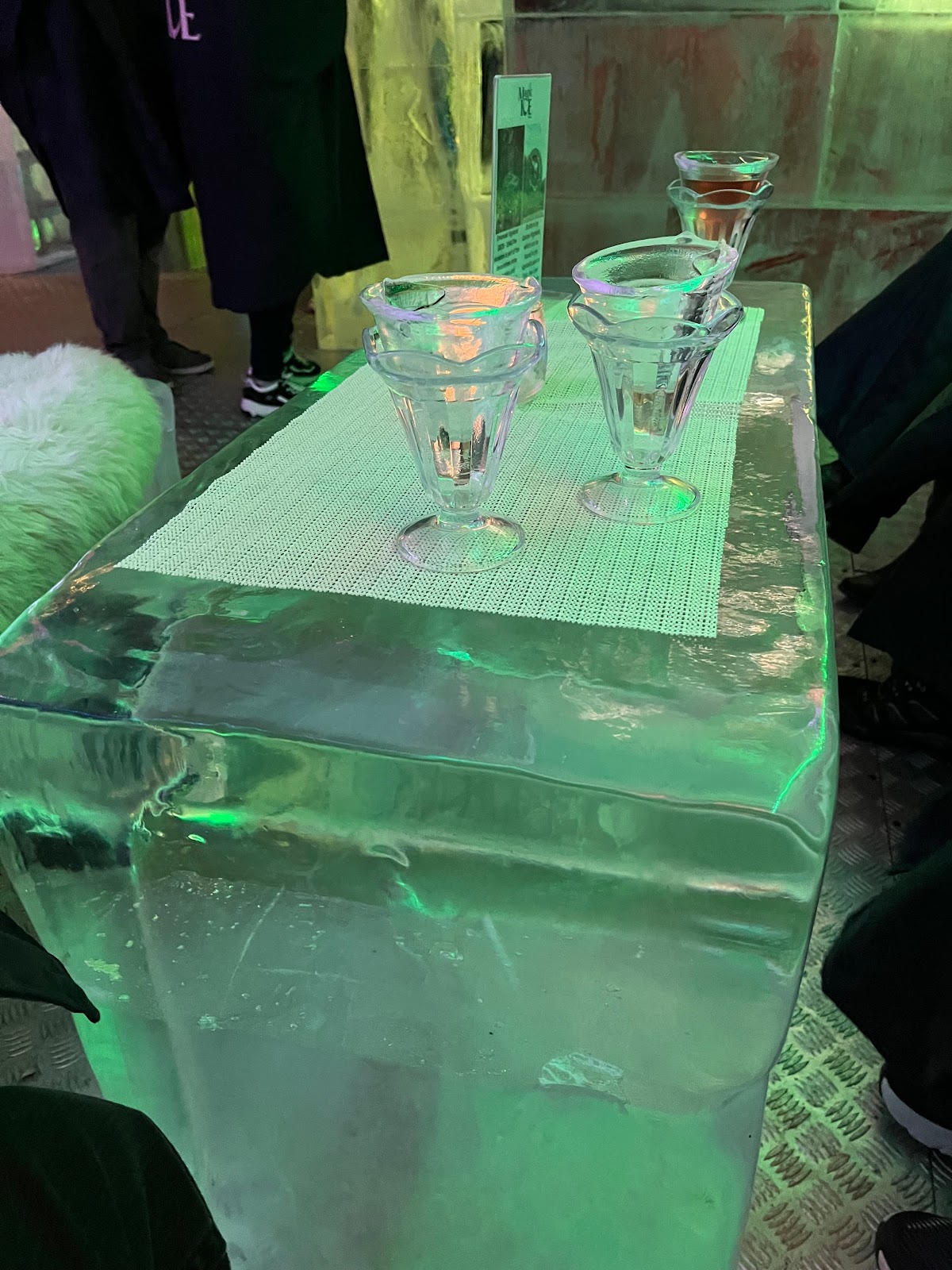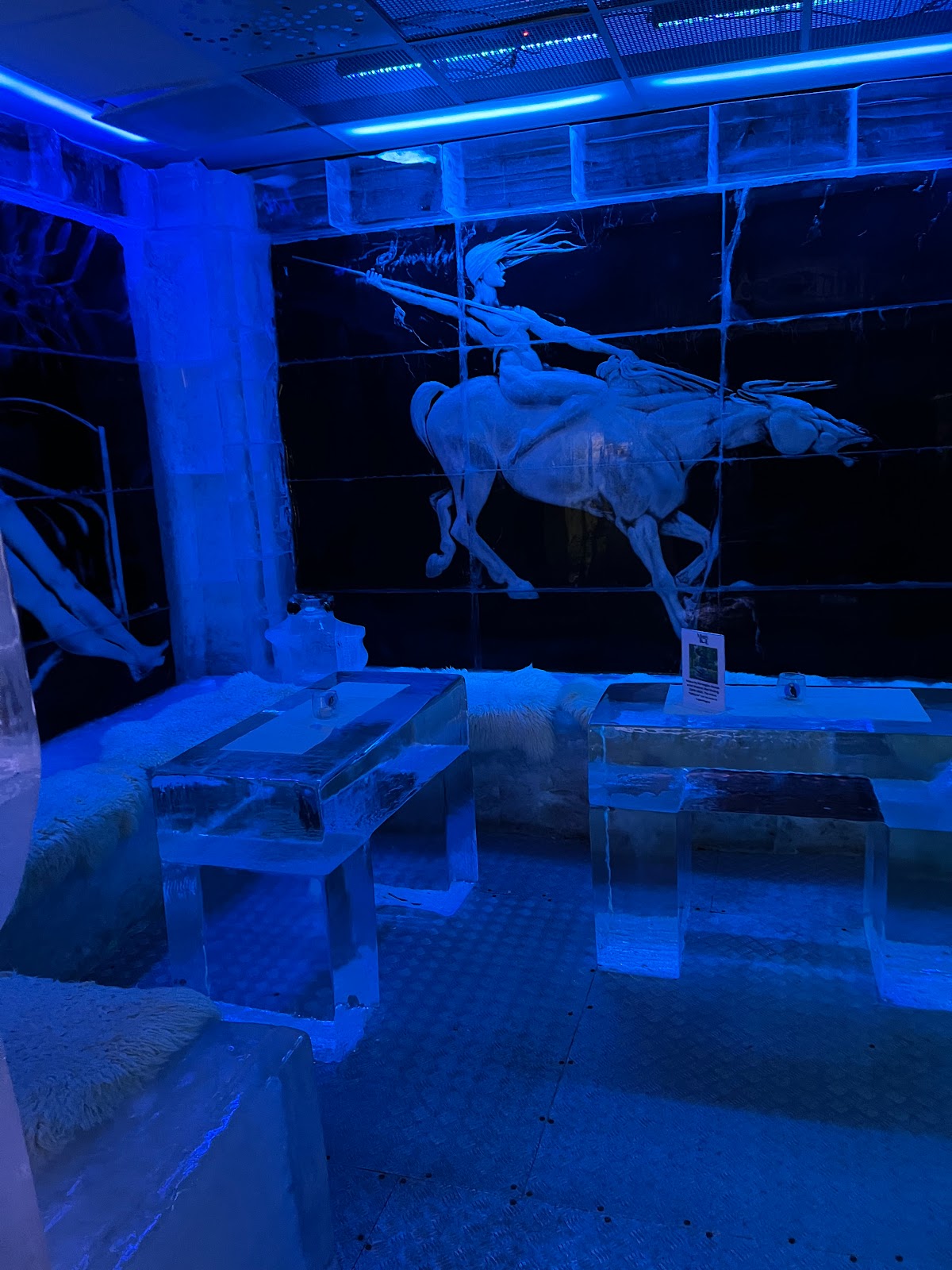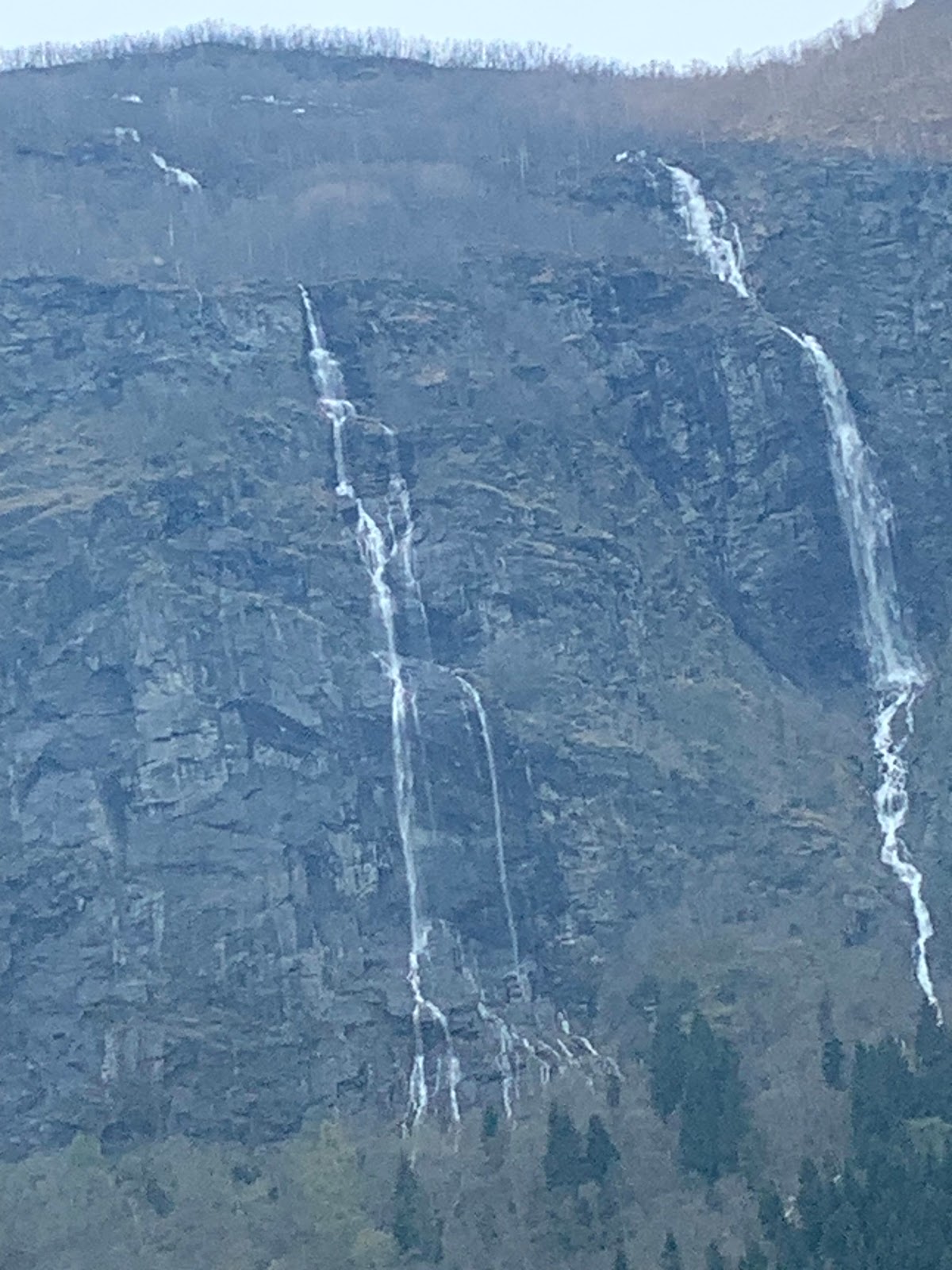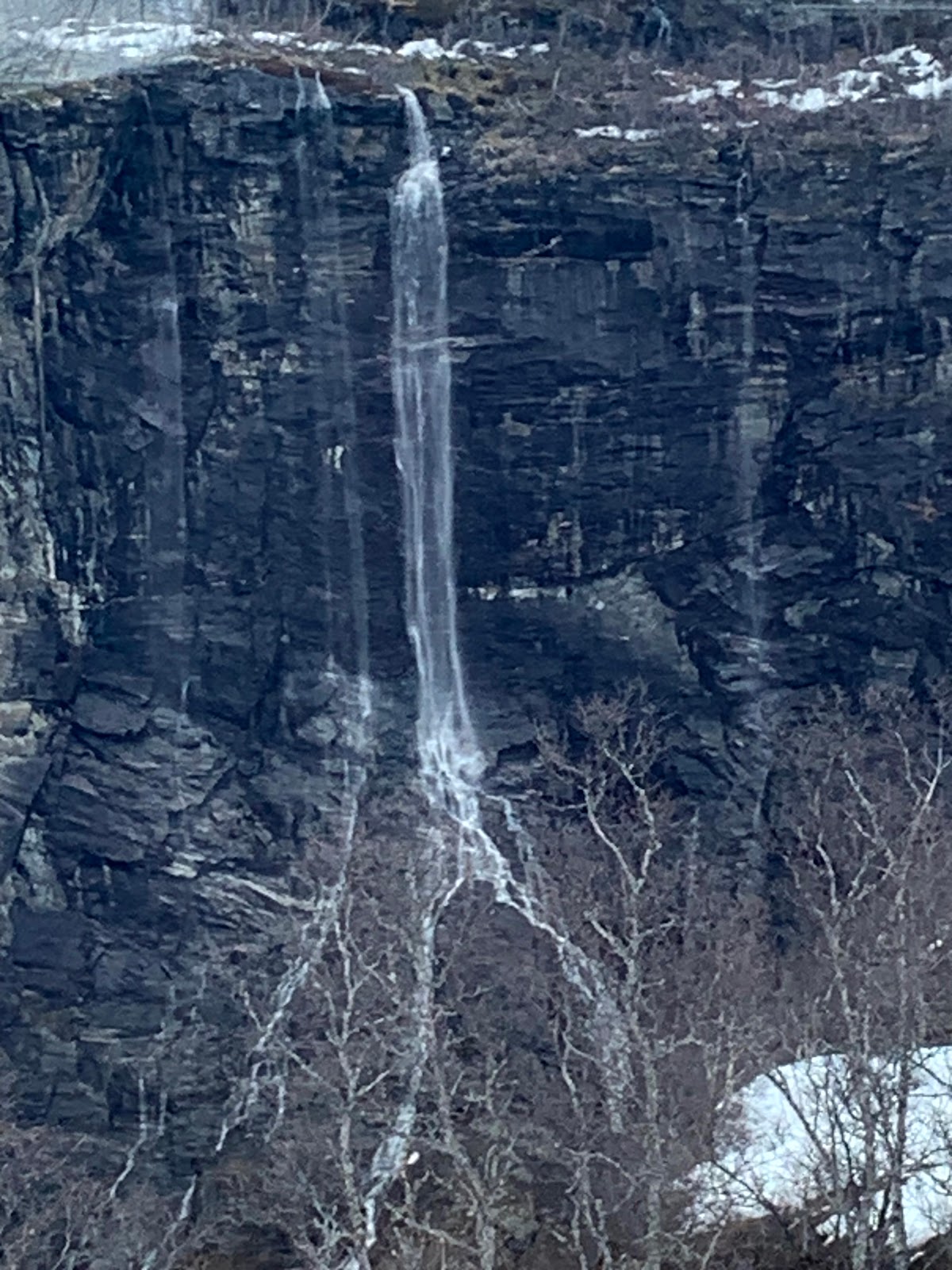Bergen and More Time in the Fjord
At approximately 400,000 residents, Bergen is the second largest city in Norway. Its origins trace back, like Amsterdam, to the early trade routes. But also, like most of Norway, it's roots trace to the Vikings. In 1066, but before William the Conqueror prevailed in conquering England, the English defeated the Norwegian King Harald Hardrade at the battle of Stamford Bridge. His successor, Olaf III, returned to Norway after seeing his father perish. He became known as Olaf the Peaceful and his 26-year rule was about making peace with everyone and he did that. In the process he also established the town of Bjorvin, now Bergen as the capital of Norway.
It served as the capital of Norway for a couple of hundred
years. Right next to our hotel was the old Bergenhus Fortress. If walls could
talk, this place would have 1,000 years to report.
We arrived in Bergen on the ferry from Leikanger. There’s
something special about arriving in a harbor that makes airports seem so boring.
The ferries fan out and run to all the local islands. Boat traffic is
everywhere. The fish markets beside the harbor serve as fish markets for locals
as well as restaurants for tourists. Who knows what you’ll find. We tried the
smoked whale. Don’t get upset. These are not the endangered species of whales.
They are Minke Whales. Like protected Canadian Geese, their protection has
allowed them to over-populate and there’s a season for fishing them that is
regulated. And yes, it was good, but a little too rich for us.
It rained most of the time we were in Bergen. We took the
light rail out toward the airport to see the Fantoft Stave Church. Originally
build around 1150, it was moved to its current location in 1879. In June of
1991 it burned to the ground. It has been rebuilt in the same manner as the
original and was quite a site to see. It was burned down intentionally by
members of the early black medal band scene, as were a number of churches in
the 1990s. It is rather small by today’s church standards, and it was closed so
we couldn’t go inside, but it was a beautiful structure.
An interesting travel tidbit we had not previously
experienced. When we purchased our bus and tram tickets, they were stored on
our Visa card. Apparently, the card has the capacity to have several unique ID
numbers that allow the card to serve as a unique ID without exposing the bank
card number to others. Whenever we’d present the card, it would read that
unique ID and the server would tell the bus how much time we had left on the
card. All from the alternative unique ID and not from our credit card number. I
guess this is all info stored on the credit cards with a chip. Fascinating
stuff.
I think our favorite food on this leg of the trip was fish soup and fish cakes. A
cream-based fish soup that varied in degree of thickness, but always had a
great flavor. There are food-trucks surrounding the harbor, but unfortunately
with the rain and being early-season, most were not open. But the seafood
restaurants beside the harbor made excellent soup as did a local restaurant a
few blocks away.
The fish soup and fish cakes, another specialty of Bergen.
One afternoon, we made a reservation at one of the local bars for a cocktail. Magic Ice is no ordinary bar. Everything in the bar was made of ice. There were ice carvings all around us. There was an ice bar itself with staff behind it serving drinks. There were ice tables and ice benches (made warmer to sit on with sheepskins.) We both had their special drink, a white wine with special berries from above the artic circle and we each had a gin and tonic. The glass was made of ice. The woman who started it is from the Lofoten Islands and has been successful although she has closed the one in Oslo. We did find out that the sculptures only last 3 to 4 years and need to be replaced because they start cracking. The inside temperature is a constant 23 degrees. The word of the day was chilling, as in ‘it was a chilling experience.
After slugging through the rain for a day or so, we called it a day one afternoon and went back to our hotel room. We turned on the TV and discovered some differences in TV in the US and Norwegian TV. For one, watching with sound in English and subtitles in Norwegian was not only different but difficult. The tendency to want to read along to make sure I was understanding what was being said was only confounded by not understanding what I was reading.
The language included four letter words including the ‘f’
word that you’d never see on TV in the US. It did seem to make the
conversations more like we might hear them in real life. Mature subject matters
were more openly discussed too.
Advertisements seemed to be shorter and simpler. There was no
fine print designed to qualify what was being said. Maybe this was because we
did not see a single drug commercial and no auto leases. Perhaps all of our
fine print designed to inform people really doesn’t do anything.
The car commercials are big here. Norway has implemented
incentives to drive the country to almost exclusively electric vehicles usage by
2026. Almost 60% of the cars sold in 2022 were electric. In fact, in the
fjords, there is one electric ferry in use that is a battery-powered, carbon-fiber
boat and has a four-hour range that is used for boat tours of the fjords. A
couple of the fjords are UNESCO sites, and they are mandated to be green by 2026.
I doubt that they’ll make this goal, but they have their sights set on doing
the best that they can to achieve it. It seems to have established a mindset in
the population that points toward green. The investment was seen in charging
stations everywhere.
A fun thing happened while using Google maps. We were looking for something and the instructions came back to us to walk 70 meters where we'd find a stand-up scooter to take us the rest of the way. These apps must not know who they are dealing with.
On our last full day in Bergen, we caught a train out to
Myrdal, a stop on the train from Bergen to Oslo. We got off at the snow-covered
station and hopped onto a local train that took us down into the town of Flam
on the Aurlandsfjord which is a branch of the Sognafjord. The Flamsbana, the
Flam Railway, train took us from the mountain pass at 867 meters (2,844 feet)
down to Flam at almost sea level. The train had all the color of the Durango to
Silverton or the Cumbres and Toltec railroads with scenery to match. At the
highest elevations, everything was covered with snow, but there were signs of
spring with snow melting. As we descended the trickling waterfalls became more
frequent and more pronounced. By the time we hit the lower sections of the
valley, every crevice in the hillside of the fjords seemed to have a waterfall
coming through it and some were enormous. The word of the day is waterfall. We
jumped back on the Sognefjord ferry to get back to Bergen. This time the sun was shining as we reached Bergen and we had a different perspective of the City. Susanne and I
decided that we could never tire of a ferry ride through a fjord.
When we talk about the mountains here, places like Myrdal at 2,844 feet don’t seem high to those of us that live above 5,280 and frequent the 14ers in Colorado. But keep in mind that that the latitude here is at 70 degrees is closer to Juneau and Anchorage, Alaska, so the winters are colder with more snow on what are lower elevation mountains. It truly makes for wonderful scenery.
Our time in Bergen is done. We’re both recharged
and ready for the city of Oslo. We’ve managed to stay in the present as much as
humanly possible. But we feel a little sadness as our time on the fjords is
coming to an end. We’re on the ferry as I write this, and there’s water on both
sides of us with snowcapped mountains all around us. Kenneth Grahame said it
best when he wrote “there’s nothing – absolutely nothing – half so much worth doing
as messing about in boats.”


































Comments
Post a Comment